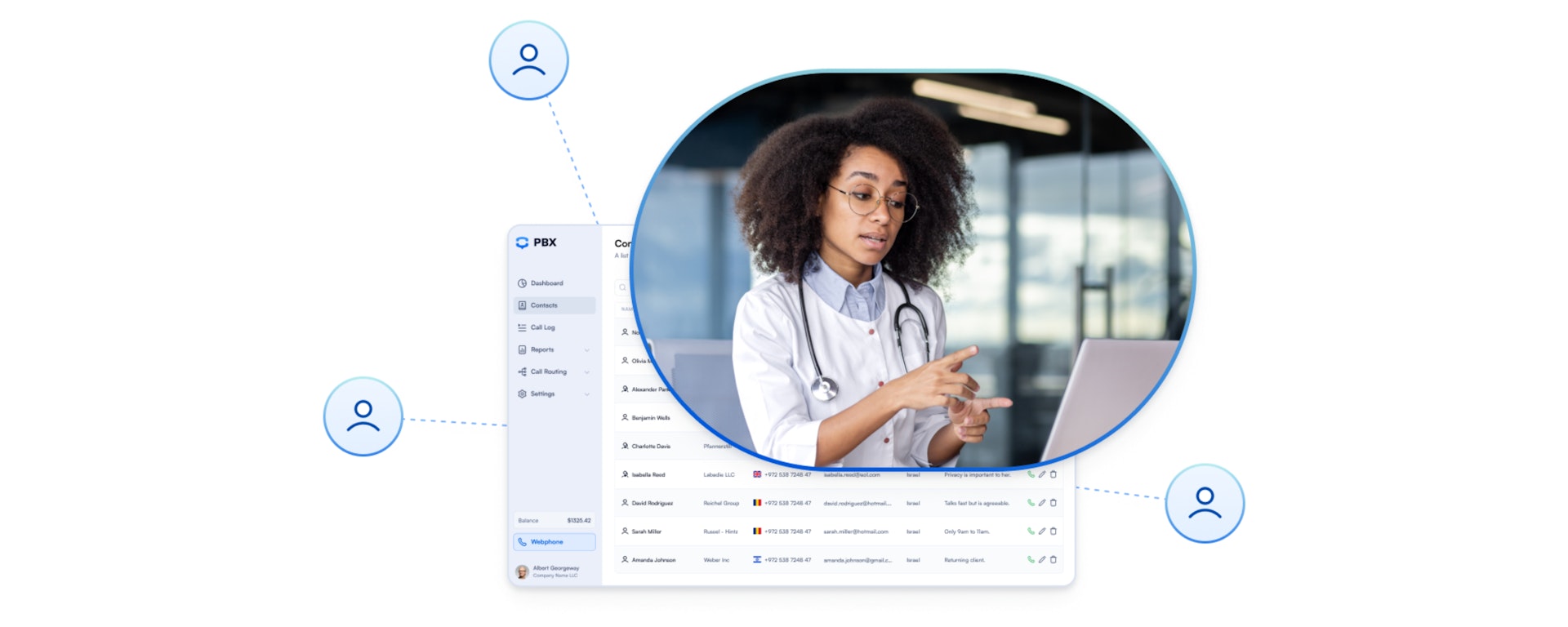Since the pandemic, communication has become the backbone of the healthcare industry.
VoIP offers healthcare providers cost-effective, scalable, and secure communication solutions that are fully HIPAA-compliant, ensuring peace of mind in patient communication.
In this guide we will delve into how VoIP works, its key benefits for healthcare organizations, and how to choose the best solution for your practice. This is best suited for decision-makers in healthcare (clinic managers, CIOs, etc.) looking for effective communication tools.
Key takeaways:
- VoIP provides healthcare providers with cost-effective, flexible, and secure communication solutions that meet HIPAA requirements.
- Key benefits include integration with EMR/EHR systems, scalability for growing practices, and enhanced patient communication.
- Healthcare providers should consider factors like service quality, security, and customizability when selecting a VoIP provider.
What Is VoIP, and how does it work for healthcare?
Let’s break it down: Voice over Internet Protocol (VoIP) is a technology that allows you to make voice calls using an internet connection instead of traditional phone lines. In simple terms, it converts your voice into digital data and transmits it over the internet. It’s like talking on the phone, but with the flexibility of internet-based tools.
How a call center for healthcare can help you?
- Reducing manual call management: VoIP automates call routing, minimizing delays and reducing the administrative burden. Patients are directed to the right department quickly, improving efficiency and staff workload.
- Enabling virtual consultations: VoIP supports secure audio and video calls, making telemedicine accessible without additional equipment. This allows you to offer timely virtual care for remote or urgent cases.
- Streamlining appointment management: VoIP integrates with scheduling systems to send automated reminders, reducing no-shows. This helps keep patients engaged and minimizes the financial impact of missed appointments.
- Improving patient communication: Features like voicemail-to-email and secure messaging enable patients to communicate easily with providers. This flexibility enhances the overall patient experience and satisfaction.
- Supporting multi-location practices: VoIP connects multiple locations under one system, allowing smooth communication between clinics or departments. Staff can access patient data and calls from anywhere.
- Enhancing data integration with EMR/EHR: VoIP integrates with EMR/EHR systems, automatically logging patient calls and reducing manual data entry. This cuts down on errors and improves efficiency.
- Ensuring HIPAA-compliant communication: VoIP providers ensure encryption and HIPAA-compliant phone service communication. This keeps patient data secure during both everyday communications and telemedicine consultations.
Why should healthcare providers consider a VoIP call center?
There are many reasons, including:
Cost savings, flexibility, and scalability
One of the most immediate benefits of VoIP is cost savings. Since it uses the internet, VoIP calls are generally cheaper, especially for long-distance and international communication.
According to a study by Frost & Sullivan, healthcare organizations can save up to 30% on communication costs by switching to VoIP.
If you are a healthcare provider who handles high call volumes, this can translate into significant operational savings for your business. Additionally, VoIP offers unmatched flexibility and scalability. You don’t need all the extra hardware expenses; all you have to do is add extra lines to your VoIP service.
Importance of secure communications in healthcare
Another thing you are probably considering is security. We know it's a top priority in healthcare, especially in an industry governed by strict regulations like the Health Insurance Portability and Accountability Act (HIPAA).
The good news is that VoIP solutions are designed with security in mind, offering encryption and other safeguards to ensure that sensitive information remains protected.
Consider a hospital dealing with sensitive patient information daily. A secure VoIP system guarantees that any communication, whether a virtual consultation or a routine patient inquiry, remains protected from unauthorized access, giving both providers and patients peace of mind.

Key features of a call center for healthcare
HIPAA compliance and security
Since compliance with HIPAA is non-negotiable for you, VoIP systems designed for healthcare prioritize security features like encryption, secure lines, and data protection measures. These ensure that patient data remains confidential, even when transmitted over the internet.
In a busy hospital, where patient data is exchanged constantly, a VoIP system ensures that patient privacy is maintained without sacrificing speed or efficiency. For example, during virtual consultations or routine calls, VoIP ensures data protection, minimizing the risk of breaches and HIPAA violations.
At PBX.IM we guarantee 99.99% uptime, ensuring your communications are available in case of emergency. We are also HIPAA, ISO27001 and GDPR compliant. You can read more about our VoIP for healthcare solution for medical providers.

Integration with EMR/EHR systems
Another Electronic standout benefit of VoIP is its ability to integrate seamlessly with Medical Records (EMR) and Electronic Health Records (EHR) systems.
For example, if a patient calls in to schedule an appointment, that interaction can be logged directly into their digital record, reducing the chances of errors and improving efficiency.
Scalability for growing healthcare practices
As your healthcare organization expands, your communication needs become more complex. VoIP solutions are scalable, meaning you can easily add new lines, devices, or locations without major changes to your infrastructure. Features like Direct Inward Dialing (DID) allow your staff members to have their own direct phone numbers, even across multiple locations.
For example, let's imagine that you want to open a new clinic in a different city. With VoIP, you can quickly set up your phone systems for the new location, link them to your existing system, and manage all communications from a single platform.
Benefits of a call center for healthcare
Knowing the features is just the first step, but let’s dive deeper into the benefits.
Enhancing patient communication and satisfaction
In healthcare, we all know how critical time is. Patients expect timely and responsive communication, and VoIP technology can help meet these expectations with its versatile features. You can automate appointment reminders, route calls efficiently, and even use virtual receptionists.
Save time, unburn your employees, and make your patients feel cared for - win-win-win, isn’t it?
Supporting telemedicine and remote care
In 2022, the global telemedicine market was valued at approximately $87.8 billion. It is projected to grow to $285.7 billion by 2027, with a compound annual growth rate (CAGR) of 26.6%. The U.S. telemedicine market alone was worth $38.04 billion in 2022, and it is expected to continue expanding at a CAGR of 15.1% through 2030.
With VoIP, you can jump on the growth wave and offer remote consultations, securely transmit patient data, and stay connected with patients regardless of where they are.
How to choose the right call center provider for healthcare
Now that you understand all the benefits that VoIP offers, you are probably thinking about how to choose the right provider for your healthcare business. Here are a couple of things to consider:
- Service quality & reliability: Choose a provider with proven call quality and minimal downtime.
- Security & HIPAA compliance: Ensure encryption, secure transmission, and compliance with healthcare regulations.
- Pricing & flexibility: Look for cost-effective plans and avoid restrictive long-term contracts.
- Customization: Opt for features like call recording, analytics, and voicemail tailored to healthcare needs.
- Customer support: Prioritize 24/7 support and effective staff training for smooth system adoption.
Common challenges with a call center in healthcare and how to overcome them
Before business owners choose a call center they have a couple of concerns that make them weigh the decision of adopting such tools. Here’s a list of common challenges and potential solutions:
Ensuring call quality and reliability
One of the main concerns you might have as a healthcare provider using VoIP is the potential for poor call quality or dropped calls. However, with the right setup and internet bandwidth, these issues can be minimized. Investing in a high-quality VoIP provider and regularly monitoring your internet connection can go a long way in maintaining clear, reliable communication.
And don’t forget what we mentioned before: choose a provider that offers 24/7 support and minimal downtime.
Managing security risks
Like any technology, VoIP isn’t immune to security risks. Cyber threats are a reality, but you can protect your VoIP systems by implementing multi-factor authentication, using encrypted communication channels, and ensuring regular security updates. Working closely with your VoIP provider to stay ahead of potential vulnerabilities is the solution here.
Adapting staff to new technology
Switching to a VoIP system might seem daunting for healthcare staff who are used to traditional phone lines. But with the right training and support, the transition can be smooth. Offer hands-on training sessions and provide resources that help staff feel confident using the new system. Emphasize how VoIP can make their jobs easier, from managing calls to improving patient interactions.
Conclusion
Ready to revolutionize your practice’s communication? Explore how VoIP can improve your patient interactions and operational efficiency. Contact us today for a free consultation.
FAQs
What is VoIP, and how does it work in healthcare?
VoIP (Voice over Internet Protocol) enables phone calls over the Internet. For healthcare, it offers secure communication, flexibility, and integration with systems like EMR/EHR.
Is VoIP secure enough for a healthcare call center?
Yes, VoIP solutions for healthcare are designed with HIPAA compliance in mind. They feature encryption and secure lines to protect sensitive patient information during communication.
How does VoIP integrate with a call center for healthcare?
VoIP integrates seamlessly with EMR/EHR systems, allowing healthcare providers to log patient calls directly into their records, enhancing efficiency and reducing errors.
Can VoIP support telemedicine services?
Absolutely! VoIP is an ideal tool for telemedicine, enabling secure, real-time communication between healthcare providers and patients during remote consultations and follow-ups.
What are the cost benefits of a VoIP call center for healthcare?
VoIP significantly reduces communication costs, especially for long-distance and high call volumes. It’s a scalable, cost-effective solution for small to large healthcare practices. Check out our price plans.

I’m a VoIP product strategist with hands-on experience building and scaling communication tools. At PBX.IM , she simplifies complex topics like SIP and cloud telephony to help businesses make smart, confident tech decisions.


